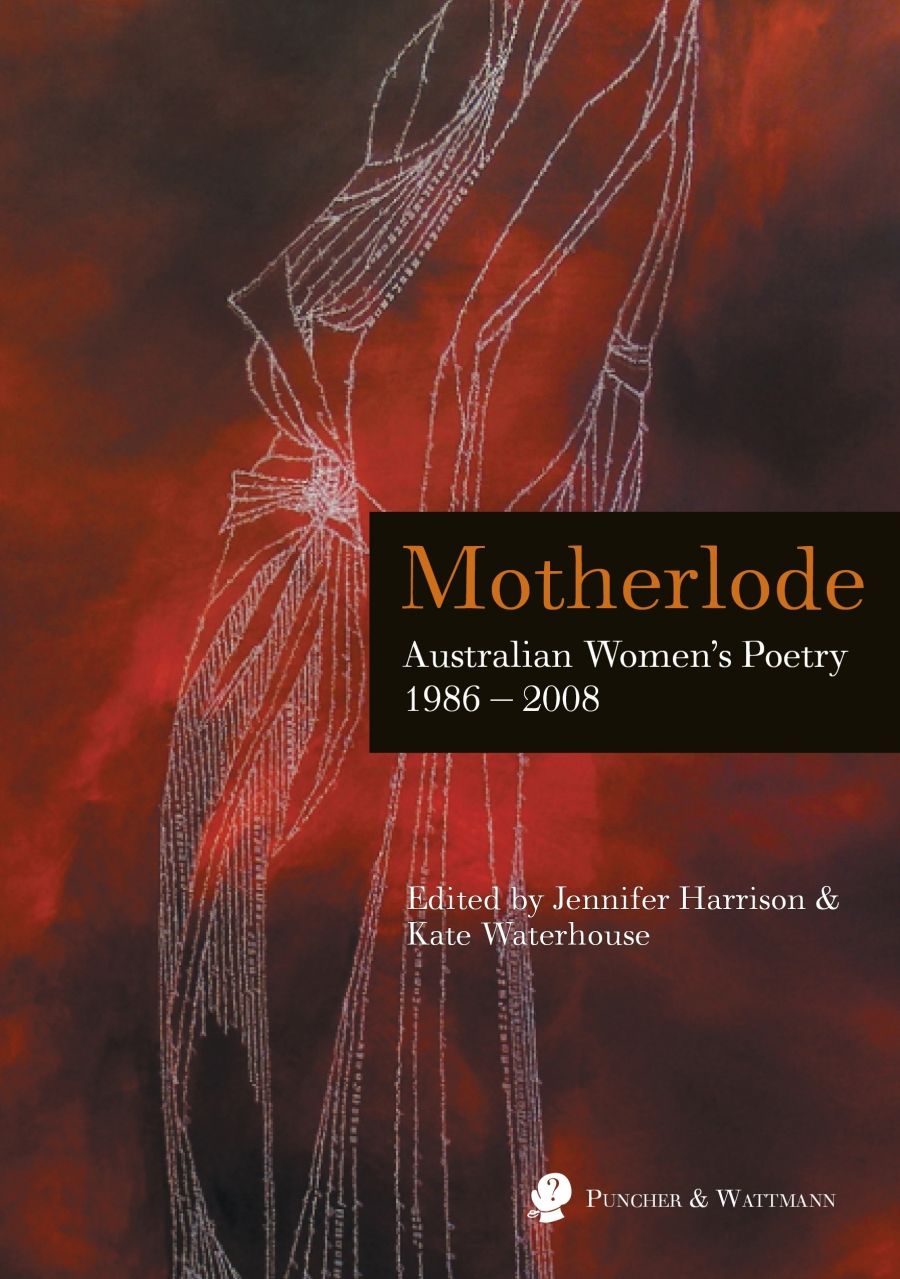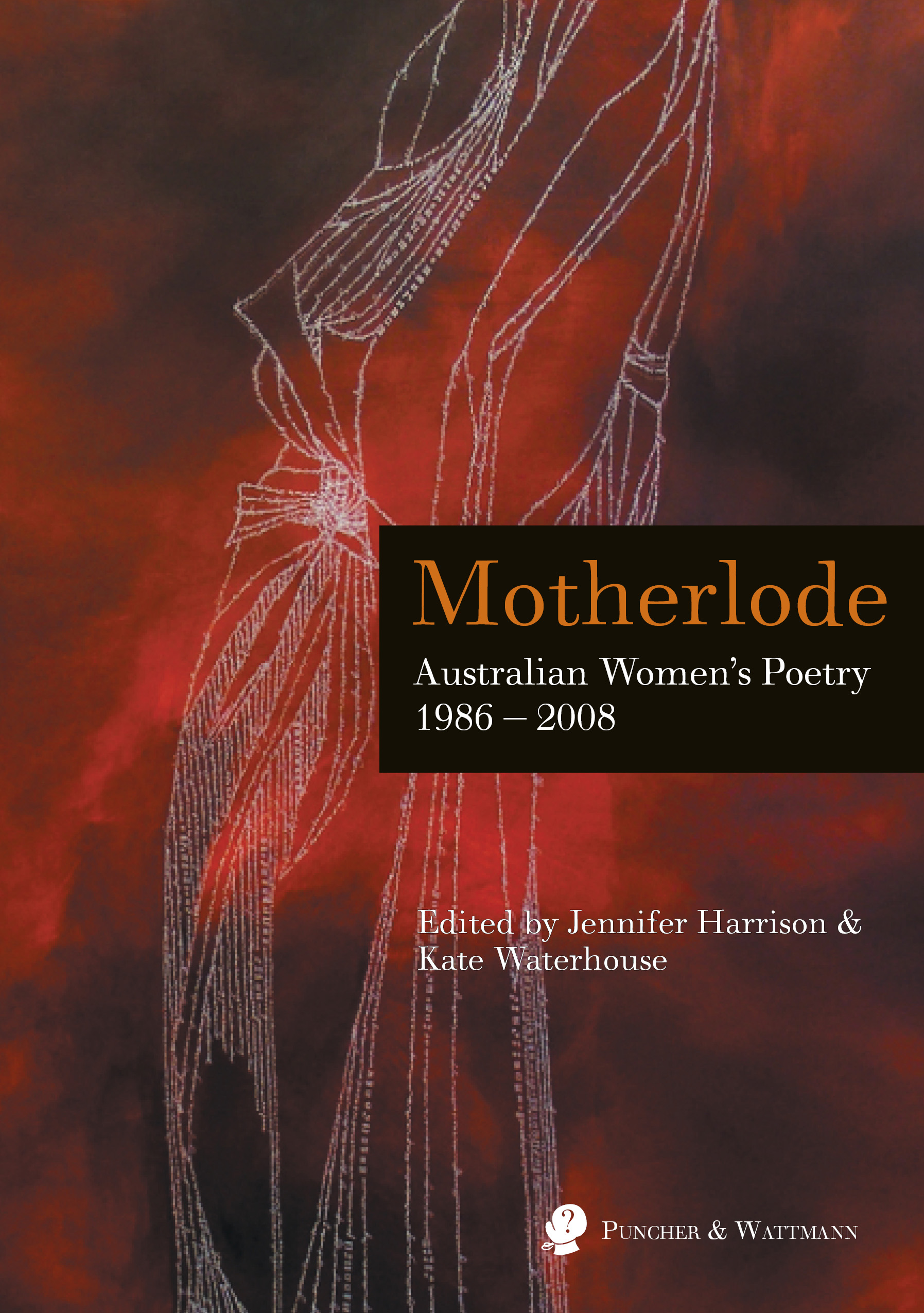
- Free Article: No
- Contents Category: Anthology
- Review Article: Yes
- Article Title: Letting go
- Online Only: No
- Custom Highlight Text:
This accessible new anthology collects the work of 125 women poets writing on the theme of motherhood. As well as having general appeal, it will introduce younger female readers of poetry to topics close to their own bodily, emotional futures.
- Book 1 Title: Motherlode
- Book 1 Subtitle: Australian Women’s Poetry 1986 – 2008
- Book 1 Biblio: Puncher & Wattmann, $29.95 hb, 342 pp, 9781921450167
- Book 1 Cover Small (400 x 600):

- Book 1 Cover (800 x 1200):

The poetry dates from 1986 to 2008. For many women, 1986 is an important date: it saw the publication of Susan Hampton and Kate Llewellyn’s Penguin Book of Australian Women Poets. Eleven years earlier, there was Kate Jennings’s Mother I’m Rooted (1975). It would be too easy to see this current volume as a tamer, post-feminist offspring to the earlier volumes, but it is worth reflecting on what has happened in the intervening thirty-three years. One question worth pondering when reading Motherlode is: where have the wild, even scandalous women of the 1970s second wave gone – the women who chose not to have children, the strident women who didn’t want the entanglements of domesticity and child-rearing?
One answer is that some of them are here in this volume, writing wildly and against the stream, about the institution of motherhood, and about some of its more grotesque manifestations. A satisfying number of poems in Motherlode rise to the occasion sceptically – even with some hostility – on the topic of pregnancy and domestic life. Take, for example, J.S. Harry’s wonderfully unmotherly poem ‘mrs mothers’ day’:
i will be yr mother
yr motherinlaw
pregnant lover aunt sister & stranger doing the splits like a millipede
each foot in a different cliché
yr fantasy of me wife immorally
impregnated by you: sons for ever!
That is not a very mother-friendly quote to begin this review with, nor is Harry’s poem typical of the poems in this volume. But there are plenty of punchy, resistant poems in Motherlode.
Harry’s is a poem which questions and twists language use as much as it does motherhood. In very different ways, Bronwyn Lea’s and Sarah Holland-Batt’s poems pose different questions about women as mothers. Holland-Batt’s stunning ‘Remedios the Beauty’ presents us with a frighteningly gargantuan mother/goddess, taking Marquez’s virgin eccentric, Remedios the levitator, to even greater heights of womanhood as she soars with the peregrines, looking down on ‘life’s livid beginning, / its blood toll, the lichen and microflora / greenish and whitish in my mother’s / mouth …’
Lea’s ‘Woman Holding a Vase’ rails more sardonically against the placing of woman as painter’s muse, ‘bright enamel on stretched / canvas – all my longing locked / into a brush’. This is a voice dying to burst out beyond the symbolic roles given to living, breathing women: ‘cheerful paper doll / inflating into a pneumatic toy / naively posed like 1950s soft-core porn’; ‘the Cycladic fertility doll’; the modernist madam of the future, ‘Arranging flowers with / timeless, jazzy optimism’.
Resistant in a different way, Isobel Robin’s heroine is St George’s wife. She is all a woman wants to be: feminine, serving, saved from the dragon by the knight: ‘Scooped aboard that snorting stallion, / held hard against his rigid mail, / she had to marry him’ (‘St George’s Wife Remembers the Dragon’). She cleans his house, makes him toast and tea, irons his shirts. In childbirth, ‘She shrieks (knowing her hips are torn apart) / that dragons are more merciful. / If it’s a girl, she cries, / I’ll tell it to choose dragons every time!’ There is humour here, amongst the birth-givers, as well as the ability to step imaginatively into other lives: ‘She would dream of dragons, but / his sword wants sharpening …’
However, all is not resistance, at least not of this wild kind. Often, motherhood comes with the heavy freight of exhaustion, pain and reluctance, bound tightly together with overwhelming love. Emma Lew’s ‘Plantain’ is a beautifully crafted song to pain and commitment, a singing in ‘the night you climbed crying into, / like a story, with no hurry’. The coming child is blessed by the mother with the future, with the promise of sadness, the momentousness of new birth, and the steely beauty of commitment: ‘I want to rise close in your heart. / I have named you and feared… // I wanted to look at the moon / in your fingers, as if to say, / I’ve chosen’ (‘Plantain’).
Alison Croggon is able to write of birth without sentimentality or cuteness: ‘He has no speech. He hungers and is fed. Darkness is a warm / fumbling of lips’ (‘Nights’). There is gentle surprise here, in the listing of facts already known, but now known bodily and intimately. This is true, too, of Kathryn Lomer’s earthed hymn to the new child, written in contact with the ancient form of the human body:
My fingers trace the chalice of your open-plated skull,
your petal ears, the delicate Braille of vertebrae,
a poem read over and over until I have the lines
by heart.(‘September 4 & 5’)
Along with the poems of resistance, and those of bodily agony or the loss of individuality experienced by many women, Motherlode presents us with many exquisitely crafted and celebratory poems.
A further question concerns the relationship of poetic form to theme. Yes, we are presented with linked themes which structure the volume: Nature, Icons, Pregnancy, Birth, Infancy, Sons and Daughters, Daily Grind, Loss, Old Wives’ Tales, Mothers and Grandmothers, The World, and This Last Retreat. But I wanted also to see what poetic language can do, how it works as the finest, most compressed and original human deployments of language. This is what poetry is capable of, though we all know something of verse that cloys: the clichéd, nostalgic, unreflective or banal. Often a thematic approach can neglect the poetic in search of the theme. However, the editors have lived up to the promise they give in the brief introduction. As well as seeking to make poetry accessible and to ‘speak to ordinary women – any women’, they also promise that Motherlode will present us with ‘poems of the kind of quality we hoped both to read and to produce as poets ourselves’.
It is not hard to find linguistically original poetry in this volume. One example is Pam Brown’s wickedly unmotherly anti-advice for ‘Dear toddlers’ in ‘Lab Face’; or Fay Zwicky’s pained ‘Letting Go’:
Tell the truth of experience
They say they also
Say you must let
Go learn to let go
Let your children
Go
and they go
and you stay
letting them go
Or L.K. Holt’s ‘Grandmoth’, a haunting image, in clipped narrative poetry, of a dead grandmother who comes back as you take her necklace from its box, remembering the original owner: ‘I see her neck laced // with it, I see how it hangs consolingly beside / her one lonely breast.’ Out of the box flies a moth: ‘and I thought it was her: my grandmother / returning as something hungry for time not lived.’
In this cornucopia of poetry you will hear the voices of indigenous women who were removed from their families, women who chose not to become mothers, and orphaned women. Men should read it too: they will discover poems that highlight in richly confronting language the most atavistic and every-day of realities: birthing, mothering, coping, letting go.


Comments powered by CComment